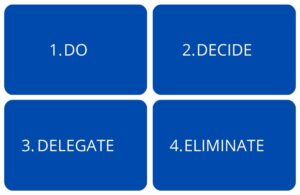How to Manage Time Effectively and Increase Productivity
In today’s fast-paced world, effective time management is an important skill. Learning how to make meaningful use of your time can significantly boost not only your productivity but also yield better results in all aspects of your life. These techniques can help you better organize your time and achieve much higher efficiency.
Eisenhower Matrix
One of the most effective methods for time organization is the Eisenhower Matrix, which helps you set priorities and better schedule tasks. This principle involves dividing tasks and activities into four categories based on their importance and urgency. These categories are:
- Important and Urgent (DO)
- These activities require immediate attention because they can have a significant impact if not done on time.
- Examples include approaching deadlines, unexpected crises, or urgent problems. These tasks need to be addressed immediately!
- Important but Not Urgent (DECIDE)
- These tasks are important for achieving long-term goals but are not urgent. They often involve planning, personal development, or preparation for future tasks. Even though they are not urgent, it is important to systematically address them and schedule time for their completion.
- Examples include studying for future exams, working on a thesis, or attending workshops and seminars.
- Urgent but Not Important (DELEGATE)
- These tasks require your attention but are not critical for achieving your main goals. They can often be delegated to others. Try asking a family member or friend to help you with these tasks.
- Examples include organizational matters, responding to some emails, or minor household chores.
- Neither Important Nor Urgent (ELIMINATE)
- These tasks can often be minimized or completely omitted as they are merely time wasters.
- Activities such as aimlessly browsing social media, watching TV or other activities leading to procrastination fall into this category.

The 2-Minute Rule Technique
This technique involves completing any task that takes less than two minutes right away. This simple principle allows you to quickly handle small tasks and reduce the stress of accumulating them.
Planning and More Planning!
For better time management, you can use various calendars, such as the online Google Calendar or a traditional calendar on your phone. There are also many other apps that help with planning and task completion. One of them is Habitica, a free app that helps you complete tasks and achieve goals through a mini-game. Another useful app is Todoist, which works on the principle of a classic to-do list.
Using a calendar or to-do list can significantly improve your organization and planning, leading to more efficient use of time, reduced stress, and quicker achievement of your goals with less effort.

Conclusion
In conclusion, effective time management is not universal, and what works for one person may not necessarily work for another. It is important to try different methods and adjust them to suit you best. Don’t hesitate to experiment with the various mentioned techniques and apps. If you find the ideal combination for yourself, you will be able to achieve not only great results and increase your productivity but also enjoy more free time during your college studies. 😊